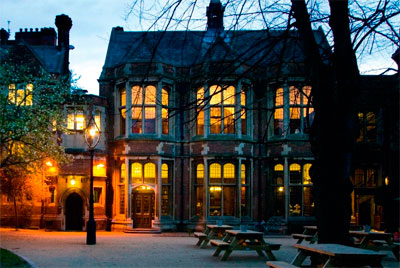It was a fitting introduction to the protagonists, from Oxford Farming Conference Director, Caroline Millar, that this would be a tussle between two opinionated Scots – so a typical Scottish night out then!
The motion This house believes that agriculture is an equal opportunities employer was excellent fodder on so many levels.

Credit: Barker Evans, under FAL
Was this actually about equality, or was it about opportunity? Was this about the UK, or was it global? Is agriculture farming, or is it everything else as well – like veterinary practice, agronomy, sugar beet sales, or the ability to change a tractor tyre?
So first generation farmer Michael Blanche, who bought his first 50 sheep on credit in 2003, told us that opportunity was not about the start, or the end, but the journey in between. He said that farming was working with nature to grow stuff that people can eat. I understood that.
He said that opportunity is a state of mind. Well that got me thinking.
Linda Tinson, an agricultural lawyer, made reference to Julie Andrews and Bill Clinton in turn. Like Bill, she said it was all down to what the meaning of the word “is” is. We were bludgeoned by statistics from surveys about women operating smaller farms, having fewer livestock of poorer quality, poorer education, less credit, and receiving lower wages than men for the same work.
So we got our fair share of percentages and definitions – floated here, sunk there – and some good, old-fashioned verbal cut and thrust into the bargain.
The President-elect of the Oxford Union Robert Harris, in the chair for the debate, reminded anyone with a contribution from the floor that they should raise their hand ‘high’ and I wondered, given what we had heard so far, whether this could be interpreted as a slight against the shorter farmers in the room?
The contributions from the floor were lively, as were those from the seconders – Aled Rhys Jones (for) and Gareth Barlow (against). And no, he wasn’t THE Gary Barlow.
We were regaled with tales of the Spartans; that the evidence was to be found in the OFC lavatories (one place apparently where women don’t have to queue but all the men do); and that the taxi drivers of Essex are moving to Spain.
And more wit in abundance; the dentist’s son from East Lothian who might be making a fool of himself, but farming had given him the opportunity to do so; the northerner with a chip on both shoulders; and the incisive comment that farmers are naturally pessimistic so when they see light at the end of the tunnel they order more tunnel.
But there was a lot of seriousness amongst the banter as the debate’s motion merited: that it is important for the farming sector to promote an equal opportunities message; that farming needs to recruit the brightest; the most innovative; that subsidy should be a reward for farming land and not owning it; and that messages are like seeds…?
We were told that education for farming is not equal; that inheritance is a definite leg-up; that growing up on a farm is a distinct advantage; and that the farming population is ageing – so no more ageing new entrants then?
It was spirited, particularly from the contingent of young (can I say that without being patronising?) Scholars in the chamber like the young lady (I say no more without invoking the discrimination police) who was used to suffering the derisory “oh you’re in farming, don’t you have a brother?”, to the farmer’s daughter who volunteered to foot-trim a ton and a half of bull, challenged convention with “let’s kick you lot out of the way and take over” and won a bottle of champagne into the bargain. Well done, the irreverent Lynsey Martin.
Linda Tinson, in the true spirit of the debate, concluded that Michael Blanche would always have the last word as he was a man. And indeed he did, although Robert Harris in the Chair nearly changed the rules and let Linda speak last. Was that intentional I wonder?
NFU Vice President Guy Smith was awarded the Farmers Weekly Magnum for the most iconoclastic contribution but gifted it to those attending from the Oxford Real Farming Conference who had spoken. Nice gesture.
Well, I have to say I went in one door and I came out the other and the Ayes took the day by 175 against the Noes 158. It was nip and tuck – if I can say that without being accused of anything.
It surprised me that we didn’t hear one of Orwell’s two commandments from Animal Farm – “all animals are equal but some animals are more equal than others” which, if the result of the debate is anything to go by, they are, but only just!
The Oxford Farming Conference Debate at the Oxford Union was sponsored by Saffery Champness, Birketts and Savills
